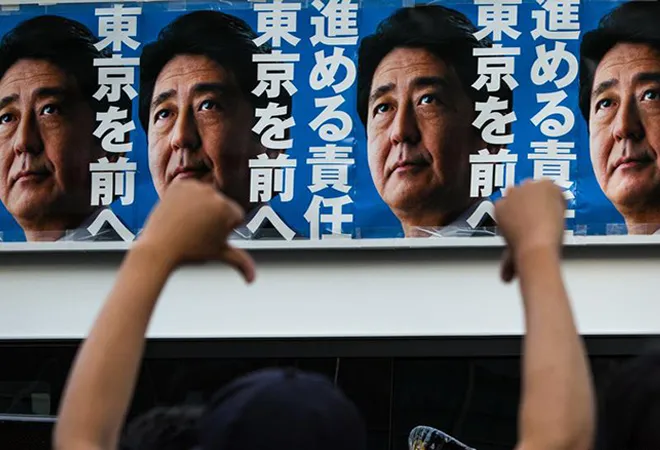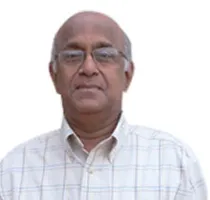-
CENTRES
Progammes & Centres
Location
In the past, Tokyo has acted as a harbinger of change in Japan's national politics. Could outcome of Tokyo election influence course of national politics?

The stunning defeat of the Liberal Democratic Party (LDP) in the Tokyo Metropolitan Assembly election held on 2 July is a major political setback for Prime Minister Shinzo Abe. It has rattled both Abe and the leaders of his party. Taking into account the potential impact of the defeat, Abe admitted that his party should take the results to heart as a profound criticism of the people and do some soul-searching. Many other LDP leaders have also stressed the need for the party to seriously reflect on the defeat and take effective steps to regain the trust of the voters.
Abe had scored resounding victories in four major national elections in Japan since 2012 when he came back to power. These victories not only consolidated his power within the LDP, but also enabled him to establish two-thirds majority strength in both houses of the Diet. Indeed, the present electoral reverse has come at a time when Abe seems well set to go all out for realising his life-long political goal of amending the Japanese Constitution.
A look at the scorecard of the present metropolitan election shows the dismal performance of the ruling LDP. Out of the total number of 127 seats of the Assembly, the new Tomin First no Kai (Tokyo Citizens First Party ) founded only recently by Yuriko Koike, the present Tokyo Governor, has grabbed 79 seats along with its allies that include the Komeito Party which is otherwise a partner of Abe at the national-level government. The LDP has secured just 23 seats, less than half of the number of seats (57) it held in the just dissolved Assembly. The Komeito set up 23 candidates who have all been elected. The Japanese Communist Party (JCP) has improved its position from two seats to 19.
Winning the Tokyo Assembly elections carries more than mere symbolic significance.
Being the national capital, Tokyo is the hub of all political and commercial activities in the country. Populated by about 13.5 million people, its economy is larger than that of the Netherlands. Further, the fact that Tokyo will be hosting the 2020 Olympics adds a lot of importance and even glamour to Governor Koike’s role in the grand event. Both the national and metropolitan governments have to work in full harmony to make a success of the Olympics.
Many Japanese political analysts believe that the outcome of the Tokyo election can influence the course of the national politics. In the past, Tokyo election had acted as a harbinger of change in national politics. For instance, in 2009 the defeat of the LDP in Tokyo Assembly election was followed by a change in the national government. In the general parliamentary election held in the same year, the Democratic Party of Japan (DPJ) defeated the ruling LDP and formed the government. At present, Abe enjoys massive majority in both houses of the Diet and with the next lower house election due only in December 2018, there is no immediate challenge to his administration.
But political analysts believe that a few important developments could flow from the present election.
First, the present electoral triumph has elevated the status of Koike to that of a national celebrity and a potential prime ministerial candidate. Even though she has ruled out her prime ministerial ambitions, one has to seriously consider her rapidly rising trajectory in recent years.
Koike joined the LDP in 2002 and rose to occupy several important ministerial and party positions in the following years. In 2016, she decided to leave the LDP and contest the Tokyo gubernatorial election much to the chagrin of the LDP bosses. She defeated the official LDP candidate Hiroya Masuda in the election and became the first woman governor of Tokyo. She soon started her own party called Tomin First no Kai (Tokyo Citizens Party ) and has been articulating her views on a range of issues related to women, senior citizens, physically challenged, equal opportunities in education, etc. In order to implement her various development measures, she argued, it would be essential to have a cooperative metropolitan assembly. She has now succeeded in realising that. In the new assembly she will have a comfortable majority to support her various policy measures. In the last one year, she has carefully projected herself as one who is deeply interested in the welfare of the citizens of Tokyo.
Second, many believe that the electoral debacle could fuel new trends within the LDP for curbing Abe’s enthusiasm for constitutional amendments.
Abe’s detractors within the party like Shigeru Ishiba may not like Abe to get the third term of the party presidency. The party election is due in September 2018. Ishiba took the present electoral debacle very seriously to embarrass Abe. In addition, the approval rates for Abe, as shown in some latest opinion surveys, have also come down to 49% from 56% due to the controversial involvement of Abe in a case where he is reported to have shown favours to his friends for starting a veterinary school in a special economic zone. As if it was not enough, Tomomi Inada, Japan’s defence minister, stirred up a political controversy implicating Japan’s Self-defence Forces in the Tokyo Assembly election.
The political situation has suddenly changed and Abe is likely to modify his political agenda in the coming months. Earlier he was toying with the idea of preponing the lower house election. But now, many in the party feel that the LDP may lose its present massive strength if elections are held now. Similarly, many party leaders also feel that Abe should be more circumspect in choosing the time for constitutional amendments.
One has to wait and watch how Abe is going to make his political moves in the coming weeks. But he is most likely to reshuffle his cabinet soon, taking into account the need for inducting people who will make the government more cohesive and less controversy-ridden.
The views expressed above belong to the author(s). ORF research and analyses now available on Telegram! Click here to access our curated content — blogs, longforms and interviews.

K.V. Kesavan (1938 2021) was Visiting Distinguished Fellow at ORF. He was one of the leading Indian scholars in the field of Japanese studies. Professor ...
Read More +